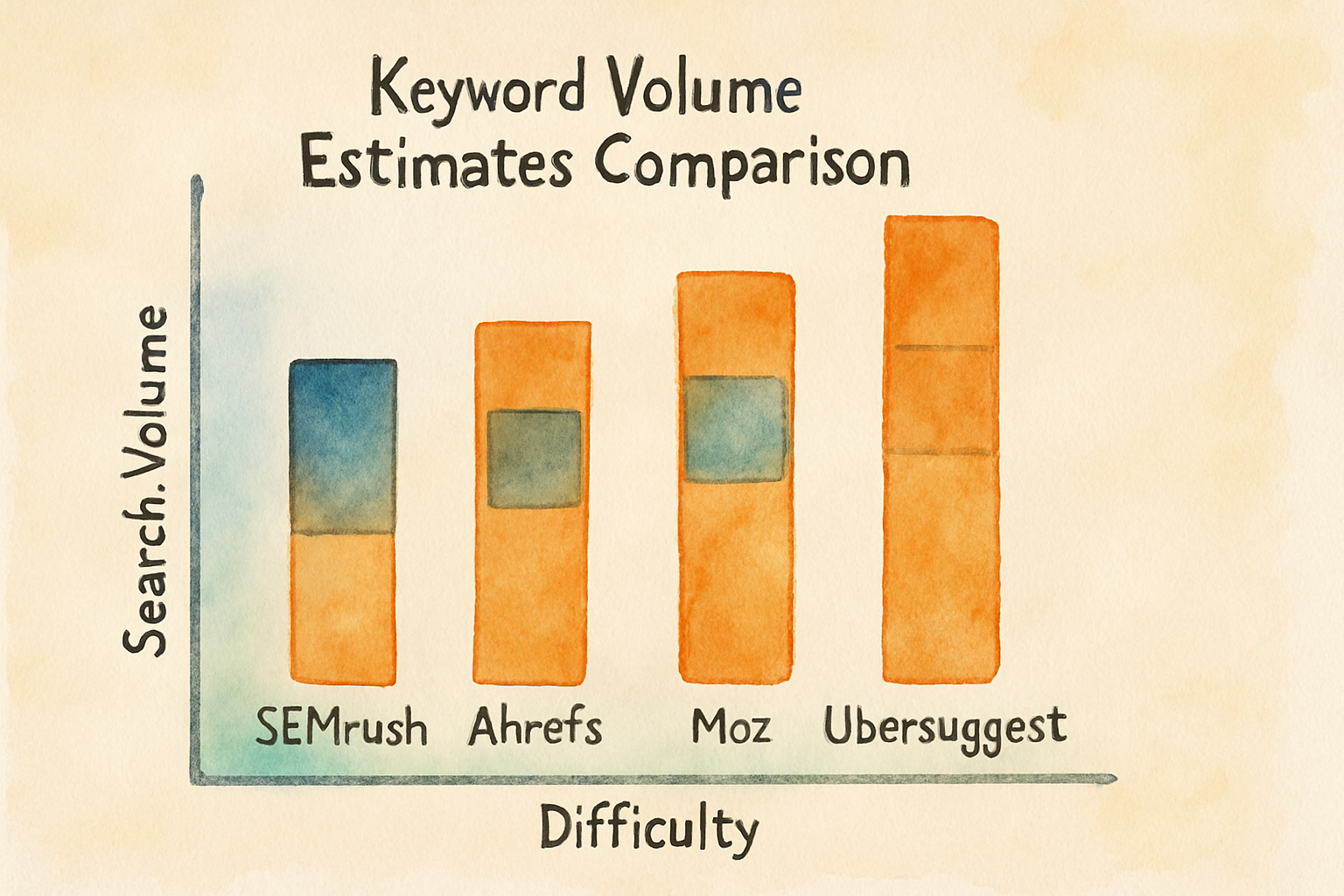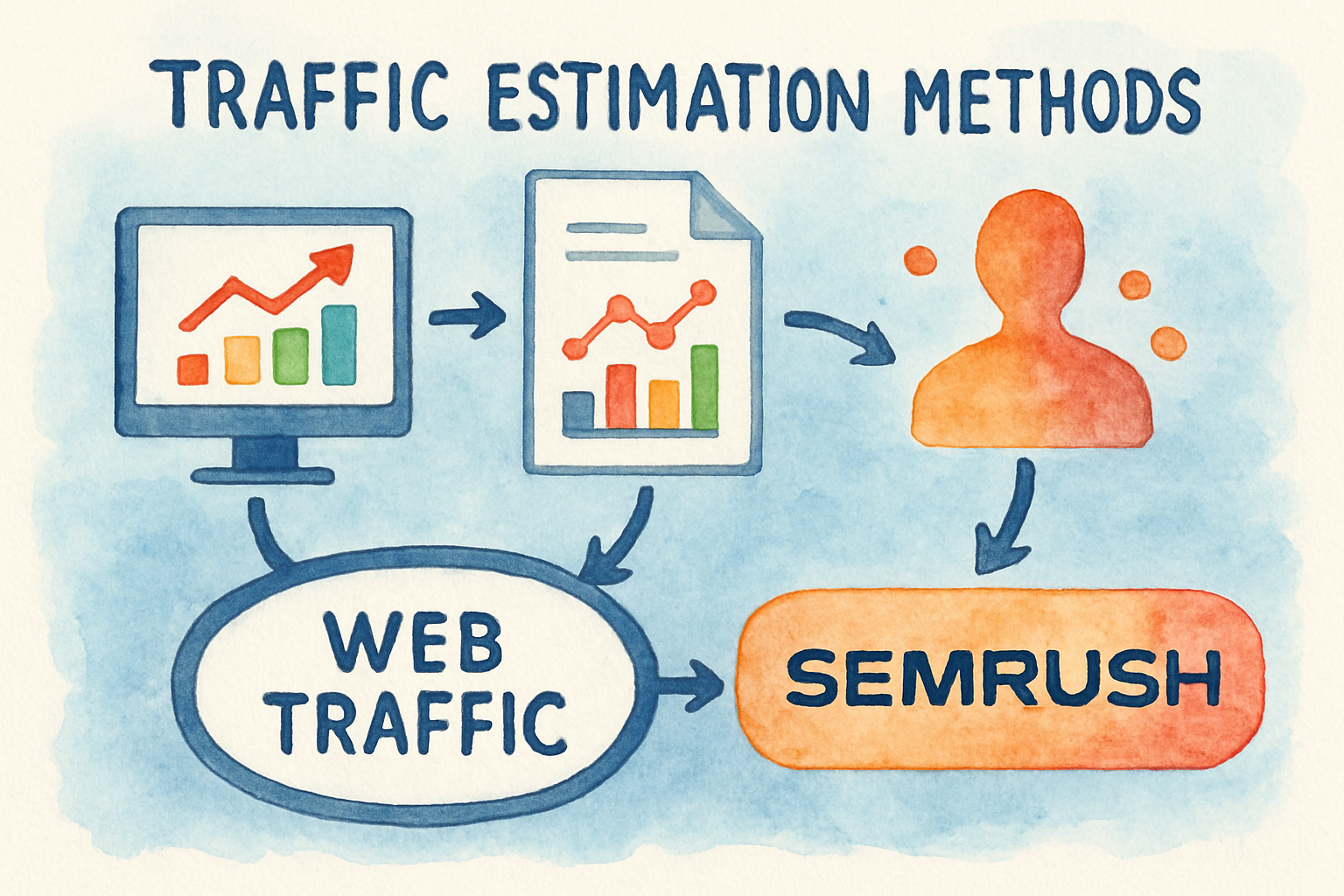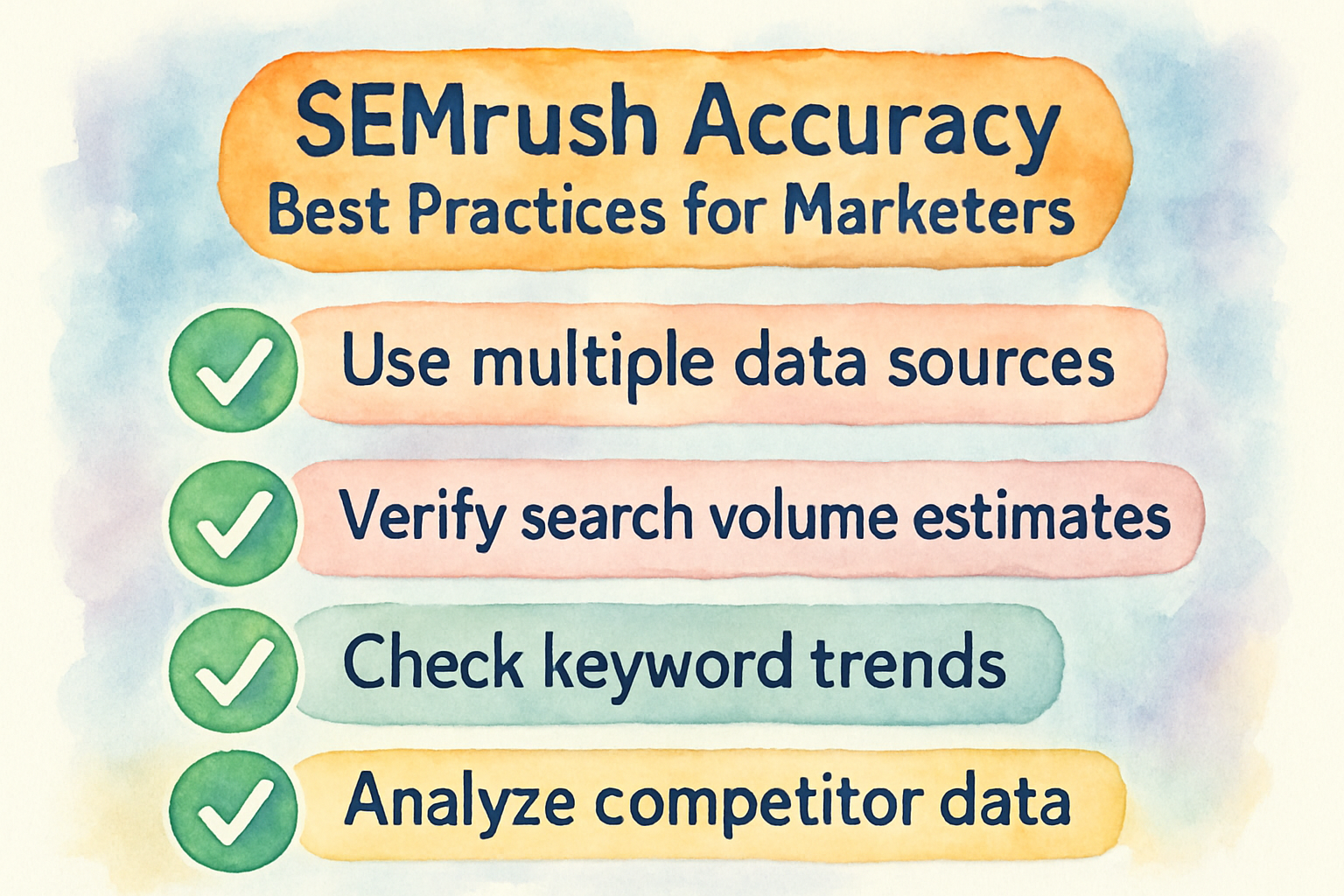SEMrush is one of the most widely used SEO tools globally, dominating many marketers’ toolkits.
But how accurate is SEMrush, really?
This guide covers a complete breakdown of SEMrush’s data accuracy, strengths, and weaknesses.
Some are dazzled by its rich features and extensive keyword databases.
Some are skeptical about its traffic estimations and keyword difficulty scores.
Some use it religiously for competitive intelligence.
Some rely on it only as a directional tool rather than a source of absolute truth.
Let’s dive right in.
How SEMrush Gathers and Estimates Data
SEMrush combines multiple data sources to provide the metrics marketers rely on.
Its key data inputs include clickstream data, third-party data providers, and algorithmic models that extrapolate traffic and search volumes.
Clickstream data collects anonymized information from users’ browsing behaviors across partner websites.
Third-party data may come from ISPs, public web information, and proprietary data-sharing agreements.
These diverse streams are then analyzed via machine learning algorithms to estimate metrics like:
- Keyword search volume (global and by country)
- Keyword difficulty scores
- Website traffic and traffic sources
- Referring domains and backlink profiles
This data fusion allows SEMrush to deliver comprehensive SEO insights with wide coverage — but with a dependency on statistical estimation rather than precise direct tracking.
Because it does not have direct access to every website’s internal data, SEMrush’s numbers reflect predictive insights based on aggregated and modelled data rather than factual counts.
This approach is common among SEO tools but inherently introduces some margin of error, especially for smaller or niche sites.
Understanding this foundational method helps explain why SEMrush’s data is accurate at scale yet sometimes less precise for granular details.
Accuracy of Keyword Research Metrics
Keyword research is arguably SEMrush’s flagship feature, offering:
- Keyword Magic Tool for brainstorming
- Keyword Gap Tool to spot opportunities
- Search volume metrics
- Keyword difficulty scores
SEM metrics like search volume and difficulty are derived from the same combined sources and modeling techniques.
Search volume estimations represent how often a keyword is searched monthly across regions.
Keyword difficulty assesses competitiveness based on backlink profiles, domain authority, and ranking patterns of current top-ranking sites.
However, these are estimations. Independent comparisons routinely find variation between SEMrush and Google Search Console or Google Keyword Planner data.
For instance, SEMrush may show keyword volume slightly lower or higher than actual search volume, influenced by dynamic user behavior changes and sampling methods.
Many SEO professionals recommend cross-referencing SEMrush's keyword data with tools like Google Search Console, Ahrefs, or Moz to get a fuller picture.
One study comparing keyword difficulty showed SEMrush, Ahrefs, and Moz tend to cluster similar scores, while newer tools like Ubersuggest deviate more significantly, either under or overestimating difficulty levels.
Thus, while SEMrush is a powerful starting ground for keyword discovery, its numbers should guide strategy rather than dictate it rigidly.
(Verified with sources as of 2025-08-20) Elevato Digital offers a detailed look at this data nuance.

How Accurate Is SEMrush Traffic Analytics?
SEMrush's Traffic Analytics feature estimates visits, unique visitors, traffic distribution channels, and geographic audience breakdowns for any domain.
This tool is invaluable for competitor research and market analysis but should be taken cautiously as the numbers are modeled estimates, not direct counts.
Research and user tests show SEMrush traffic data is generally more accurate for larger websites with high traffic volumes.
Smaller sites or niche markets often see greater deviations due to limited data inputs.
In one detailed user comparison, SEMrush often underestimated actual traffic by a notable margin, sometimes by 50% or more when compared against Google Analytics and other tracking platforms.
For example, SEMrush might report 110,000 visitors for a site whose analytics show 280,000 monthly visits — a significant undercount.
Why the gap?
- SEMrush relies on third-party data sources and statistical modeling, which may miss low-traffic or highly segmented audiences.
- Seasonal fluctuations and campaign spikes happen after data snapshots.
- Bot traffic filtering may differ between tools.
To refine accuracy, marketers cross-reference SEMrush estimates with Google Analytics or Search Console data, leveraging the complementary strengths of these platforms.
Here’s a practical example for marketers: if SEMrush shows competitor X gets 100K visits, actual numbers might be higher — informing more aggressive or cautious investment in SEO depending on the context.
This underscores the tool’s role as a directional compass rather than a precision instrument.
Pro Tip: Use SEMrush Traffic Analytics mainly for comparative benchmarking rather than absolute traffic measurement. Combine your internal data for best results.
Source: Elevato Digital, Reddit SEO Community

Competitive Analysis and Its Accuracy
SEMrush shines as a broad competitive intelligence platform, letting users dissect competitor keyword strategies, backlink profiles, and traffic sources.
Its tools include:
- Traffic Analytics for competitor performance
- Keyword Gap Tool to spot ranking opportunities
- Backlink Audit for competitor link strategies
While these features unveil valuable snapshots, their data shares the same caveats of modeled estimates.
For instance, keyword rankings and traffic volume displayed are approximations based on public data and sampling.
Competitive data accuracy also depends on competitor size. Large, popular domains with abundant data typically show closer estimations.
For niche competitors, SEMrush might not fully capture their organic footprint due to data sparsity.
Therefore, savvy marketers pair SEMrush with Google Search Console for owned sites, and sometimes tools like Ahrefs or SpyFu to triangulate a more complete competitive view.
This balanced approach helps overcome individual tool limitations and calibrate strategies for content marketing, backlink building, and paid advertising.
Remember: SEMrush also estimates paid ad spends and CPC data which can be quite useful, but those numbers can sometimes be misleading, as some users reported underestimation or overestimation in ad budgets.
For comprehensive competitive research with an eye on budgeting, supplement SEMrush with Google Ads data to validate ad spend projections.
Reddit SEO discussions highlight these nuanced points in practical use cases.
Limitations You Should Know When Using SEMrush
No SEO tool is perfect, and SEMrush has its share of limitations stemming mostly from its estimation methods.
- Data Sampling Bias: Smaller sites often have less representation in clickstream and third-party datasets, making estimates less reliable.
- Data Freshness and Lag: SEMrush updates regularly but real-time fluctuations (e.g., campaign spikes, algorithm changes) may not be immediately reflected.
- Over/Underestimation: Studies show SEMrush tends to underestimate both traffic and keyword volumes in many cases, potentially skewing strategic decisions.
- Paid Data Reliability: Ad spend and CPC estimates can be inaccurate due to incomplete data and modeling assumptions.
- Opaque Algorithms: SEMrush does not fully disclose how certain metrics—like keyword difficulty—are calculated, leading some users to question transparency and reliability.
As one SEO expert put it, "SEMrush can sometimes paint a misleading picture if you take its numbers at face value without cross-checking."
But, knowing these constraints empowers usage as a strategic guide rather than gospel.
By placing SEMrush data within a broader analytical framework, you extract true value despite its blind spots.
Best Practices to Enhance SEMrush Data Accuracy
How can you use SEMrush effectively while navigating its accuracy pitfalls? Here are practical tips:
- Cross-Reference Data: Always validate SEMrush keyword volumes and traffic estimates with Google Search Console and Google Analytics where possible.
- Use Multiple SEO Tools: Complement SEMrush with Ahrefs, Moz, or SpyFu to capture varied perspectives on keyword difficulty and backlinks.
- Focus on Trends Over Exact Numbers: Look at movement and comparisons, not isolated data points. Is competitor traffic growing or declining? That’s more meaningful than exact figures.
- Leverage Industry Benchmarks: Combine SEMrush’s broader insights with niche-specific data, like ad provider minimum traffic requirements (e.g. Mediavine, AdThrive thresholds) to estimate website health.
- Apply Caution with Low-Traffic Sites: For smaller websites, SEMrush data can be volatile. Use this data as directional, supplement with your own analytics.
- Update Regularly: SEO data changes frequently. Schedule regular SEMrush audits rather than one-off checks.
Following these practices helps you harness SEMrush’s strengths while mitigating risks from its inaccuracies.

Remember, SEMrush is a starting point, not the final word.
Alternative Tools to Consider for Cross-Verification
No single SEO platform reigns supreme in all areas. To bolster your insights, consider:
- Google Search Console: Your trusted source of actual search traffic and keyword rankings directly from Google.
- Ahrefs: Known for robust backlink data and keyword research with a slightly different algorithmic approach.
- Moz: Offers domain authority and keyword tools that sometimes align with SEMrush.
- SpyFu: Focuses heavily on competitive intelligence and historical keywords.
- Ubersuggest: Popular among beginners for ease of use and simple keyword metrics, though less precise.
All tools have pros and cons. For someone serious about accuracy, combining SEMrush with Google Search Console and at least one other paid SEO tool is wise.
This approach helps you avoid being misled by the quirks of any algorithm.
For detailed comparison and alternatives, check out our article on budget-friendly SEO tools.
Conclusion: Making the Most of SEMrush Despite Limitations
So, how accurate is SEMrush? It is reasonably accurate for large-site keyword research and gaining broad competitive insights.
However, its figures are estimates built on complex data sampling and algorithms, making precision inherently limited.
This means you should leverage SEMrush data as a directional tool alongside your own analytics and supplementary SEO tools like Google Search Console and Ahrefs.
Knowing what influences SEMrush’s accuracy helps you set realistic expectations and make more informed decisions.
In essence, SEMrush is a powerful platform for SEO and competitive intelligence — just not a crystal ball.
When used wisely, it accelerates strategy development, saves time on research, and uncovers opportunities.
But the best marketers will interpret its data critically and never base key decisions on SEMrush numbers alone.
For actionable SEO strategy development, integrating SEMrush insights with website analytics and paid ad data can create a more holistic view.
Expert tip: Combine SEMrush with Google Ads and your in-house data for precise budget planning and keyword prioritisation.
Curious about how SEMrush stacks up against Google Analytics? See our detailed comparison here for insights.
What's Your Next Step?
Tell us in the comments: How will you apply this to your SEO and digital marketing strategy? For personalized advice, contact us!
Sources:
Elevato Digital |
Reddit SEO Discussion 1 |
Reddit SEO Discussion 2 |
RebelGrowth Alternatives Article |
RebelGrowth SEMrush vs Google Analytics Guide
Looking for additional insights on SEO tools? Don’t miss this comprehensive resource on Long Tail Pro vs Ahrefs keyword research.
For bookkeeping and client management related to your marketing agency, have a look at Quantinor’s Ultimate 2025 Guide.